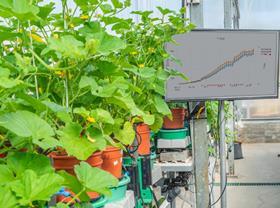
The importance of maintaining crop productivity under abiotic stresses like excess heat or cold, drought and salinity is growing for farmers today.
An increased ability to screen a large number of plants simultaneously for tolerance to such abiotic stresses is therefore a major step forward.
Plantarray, developed by Israel-based Plant Di-Tech, is a fully automated, sensor-based, phenotyping platform that enables scientists, breeders and researchers to quickly and easily carry out simultaneous performance analyses of whole plants.
The system measures plant transpiration, biomass accumulation, water and nutrient use efficiency, key physiological traits activity and the environment, in order to conclude how productive the plant is under various environmental conditions.
The tool improves sustainability aspects from many different angles. By speeding up processes and cutting costs, plant strains are quickly and efficiently identified, especially those best adapted to combat the range of abiotic stresses. Very quickly, economic and safe doses of the specific inputs are identified for each species.
Hillel Magen, VP Agronomy at Israel Chemicals, commented: “The system is being used by us to test fertilisers, new and existing. It helps us greatly in the validation process of the research. When performing a field trial, you need to conduct a few trials simultaneously and at the same time try to filter the background noises - non-homogeneous soil, weather disturbances and other variants that affect the process. This is, inevitably, a long process when it comes to seasonal growth.
'This system allows us, within a few weeks only, to make initial selection, sort, exclude unresponsive candidates and decide, with high confidence, whether to proceed with the field experiment or return to the lab. This way, it shortens the development process, focuses and refines it, saving valuable time and money resources.”
In plant breeding, Plantarray technology is used to accelerate the screening of both vegetables (mainly field-grown tomatoes and cucumbers for drought tolerance) and field crops. Fruit-bearing trees also need to adapt to changing climates, with increasing numbers of regions experiencing water shortages.



